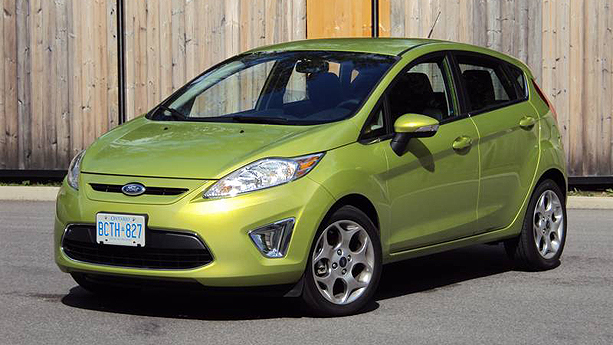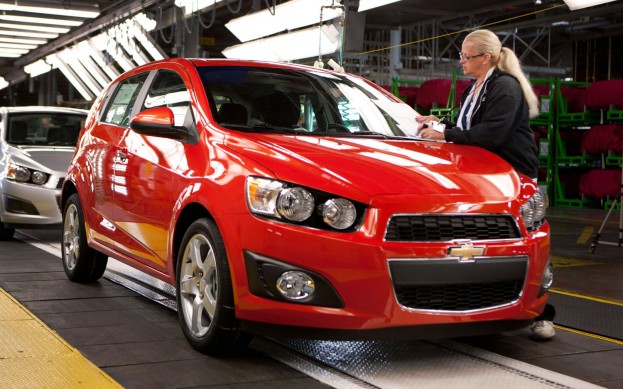 Ford Canada is claiming the title of Canada's top-selling automaker in 2011 for the second year in a row.
Ford Canada is claiming the title of Canada's top-selling automaker in 2011 for the second year in a row.
The Detroit-based auto giant said Wednesday its Canadian vehicle sales were up three per cent to 275,978 from 267,974 in 2010. The growth was led by strong sales of SUVs and crossover vehicles.
Full-year car sales were up 14 per cent, driven by strong sales of the Ford Fiesta. And the company said its F-Series pickup truck was the top-selling vehicle in Canada.
"Full-sized trucks are experiencing record-breaking sales in Canada," said Scott Cauvel, vice president of sales, Ford of Canada.
However, the company saw slightly weaker sales in December compared with a year ago, with 19,381 vehicles sold, down 0.5 per cent from the 19,477 sold in December 2010.
Cauvel added that the company is optimistic that the industry will continue to grow in 2012.

Meanwhile, Chrysler Canada said it has capped its best retail sales year since 2002 with a two per cent increase in overall light vehicle sales in December.
For the full year, combined sales were 230,992, compared with 204,955 in 2010, a 12.7 per cent increase.
"For the second year in a row, Chrysler Canada was the No. 1 market share gainer in the country," president and CEO Reid Bigland said in a release.
Industry sees uneven sales over 2011
Chrysler, the first of several Canadian automakers expected to report sales figures Wednesday, said it sold a total of 14,628 vehicles in December, up from 14,407 in the same month last year.
A disappointing 10 per cent drop in car sales to 1,394 units from 1,549 in December 2010 was more than offset by a 2.9 per cent increase in truck sales to 13,234 units from 12,858 as the company posted its 25th consecutive month of year-over-year sales growth.
Honda Canada said its Civic remained Canada's best-selling car for the 14th straight year, despite a double digit plunge in overall sales due to inventory problems caused by Japan's earthquake and tsunami in March.
"This past year was incredibly challenging because of the Japan earthquake and tsunami in March and the Thailand flood in October," said Jerry Chenkin, executive vice president of Honda Canada Inc.
"Combined, these two disasters resulted in significantly reduced production due to parts shortages for more than half of the year.
Especially hard hit was the new 2012 Civic, which had just launched and was seriously affected by a severe parts shortage for more than half of the year."
Honda said the parts shortages were responsible for a 12 per cent decline in annual sales of Hondas and Acuras to 123,121 units.
Honda said about 96 per cent of the vehicles it sold in Canada were produced at its North American assembly plants, up from 91 per cent in 2010.
Volkswagen has best-ever year
On Tuesday, Volkswagen Canada said it had its best-ever sales year in 2011, beating the previous record set in 2010 by 16 per cent. The company said it sold 3,565 cars last month, pushing the full year total to 52,604.
Reports from other carmakers were expected to confirm that the industry was on track to beat volumes reported in the years since the last recession.
Automakers have seen uneven but rising sales this year, with growth positive one month and negative the next, as economic uncertainty pervaded consumer sentiment.
Overall light vehicle sales grew 1.8 per cent in November.
A total 1.47 million vehicles had been sold as of Nov. 30 — surpassing the 1.46 million sold during all of 2009 — the worst sales year for the industry since 1998, according to data released by DesRosiers Automotive Consultants.
Sales are also ahead of the 1.45 million vehicles sold as of the end of November 2010, giving the industry momentum to beat the 1.56 million vehicles sold last year.
Still, 2011 sales volumes are well short of their pre-recession levels of 1.64 million units in 2008 and 1.65 million in booming 2007.
Analysts predict 2012 sales will be in line with volumes seen last year as recession in Europe, slower growth in emerging markets and an uncertain economic and political climate in the U.S. continue to weigh on consumer sentiment.
 GM recalling nearly 4,300 Chevrolet Sonics to check for possible missing brake pad
GM recalling nearly 4,300 Chevrolet Sonics to check for possible missing brake pad Dealers will inspect the front brakes for missing inner or outer pads and, if a pad is missing, install new pads. If needed, a new brake caliper or brake rotor, or both, will also be installed. Affected customers will receive dealer letters beginning Jan. 14.
Dealers will inspect the front brakes for missing inner or outer pads and, if a pad is missing, install new pads. If needed, a new brake caliper or brake rotor, or both, will also be installed. Affected customers will receive dealer letters beginning Jan. 14.

 Ford Canada is claiming the title of Canada's top-selling automaker in 2011 for the second year in a row.
Ford Canada is claiming the title of Canada's top-selling automaker in 2011 for the second year in a row. 
 DEARBORN, MI – Ford enters 2012 with plans to further reduce the amount of water used to make vehicles and continue showing efficiency is not only inherent in its vehicle lineup, but also in its manufacturing practices.
DEARBORN, MI – Ford enters 2012 with plans to further reduce the amount of water used to make vehicles and continue showing efficiency is not only inherent in its vehicle lineup, but also in its manufacturing practices. Happy Holidays and a Happy New Year from The Driver!
Happy Holidays and a Happy New Year from The Driver!